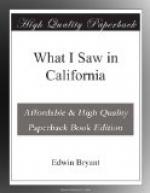The ford of the San Joaquin is about forty or fifty miles from its mouth. At this season the water is at its lowest stage. The stream at the ford is probably one hundred yards in breadth, and our animals crossed it without much difficulty, the water reaching about midway of their bodies. Oak and small willows are the principal growth of wood skirting the river. Soon after we crossed the San Joaquin this morning we met two men, couriers, bearing despatches from Commodore Stockton, the governor and commander-in-chief in California, to Sutter’s Fort. Entering upon the broad plain, we passed, in about three miles, a small lake, the water of which was so much impregnated with alkali as to be undrinkable. The grass is brown and crisp, but the seed upon it is evidence that it had fully matured before the drought affected it. The plain is furrowed with numerous deep trails, made by the droves of wild horses, elk, deer, and antelope, which roam over and graze upon it. The hunting sportsman can here enjoy his favourite pleasure to its fullest extent.
Having determined to deviate from our direct course, in order to visit the rancho of Dr. Marsh, we parted from Messrs. McKee and Pickett about noon. We passed during the afternoon several tule marshes, with which the plain of the San Joaquin is dotted. At a distance, the tule of these marshes presents the appearance of immense fields of ripened corn. The marshes are now nearly dry, and to shorten our journey we crossed several of them without difficulty. A month earlier, this would not have been practicable. I have but little doubt that these marshes would make fine rice plantations, and perhaps, if properly drained, they might produce the sugar-cane.
While pursuing our journey we frequently saw large droves of wild horses and elk grazing quietly upon the plain. No spectacle of moving life can present a more animated and beautiful appearance than a herd of wild horses. They were divided into droves of some one or two hundred. When they noticed us, attracted by curiosity to discover what we were, they would start and run almost with the fleetness of the wind in the direction towards us. But, arriving within a distance of two hundred yards, they would suddenly halt, and after bowing their necks into graceful curves, and looking steadily at us a few moments, with loud snortings they would wheel about and bound away with the same lightning speed. These evolutions they would repeat several times, until, having satisfied their curiosity, they would bid us a final adieu, and disappear behind the undulations of the plain.
The herds of elk were much more numerous. Some of them numbered at least two thousand, and with their immense antlers presented, when running, a very singular and picturesque appearance. We approached some of these herds within fifty yards before they took the alarm. Beef in California is so abundant, and of so fine a quality, that game is but little hunted, and not much prized, hence the elk, deer, and even antelope are comparatively very tame, and rarely run from the traveller, unless he rides very near them. Some of these elk are as large as a medium-sized Mexican mule.




